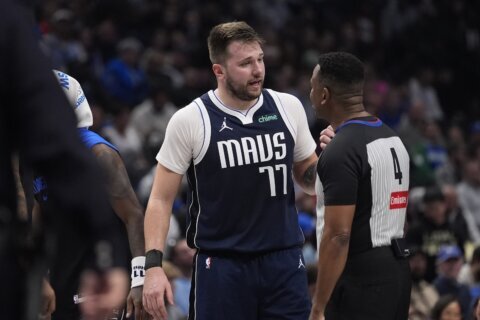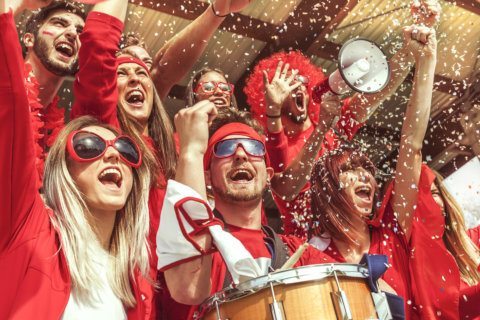SEATTLE (AP) — Ken Griffey Jr. holds a plethora of titles, especially in this part of the country. Hall of Famer. Cultural icon. The guy who made baseball in the Pacific Northwest relevant. Arguably, the greatest of his generation.
He even holds a title in association with Major League Baseball as a special adviser to Commissioner Rob Manfred.
But what’s most meaningful to Griffey currently is his association with Friday night’s HBCU Swingman All-Star Classic that served as the first major event of All-Star Game festivities, featuring players from 17 Historically Black Colleges and Universities.
The American team beat the National team 4-3 after Randy Flores of Alabama State doubled, stole third base and scored on a wild pitch with the deciding run in the bottom of the eighth inning.
But the final score didn’t matter. The meaning was in the game taking place.
Griffey delivered the game ball to fellow Hall of Famer Andre Dawson, who played at Florida A&M in the 1970s, for the ceremonial first pitch. Former Negro League players Sam Allen, Pedro Sierra and the family of Josh Gibson were honored before the game.
Griffey spent time in both dugouts doing television commentary and chatting with participants, and the entire stadium of roughly 10,000 fans broke out singing and dancing when Naughty By Nature’s “Hip Hop Hooray,” — Griffey’s walk-up song in the 1990s — was played between innings.
The event was an idea generated by Griffey, fostered into reality with help from MLB and the MLB-MLBPA Youth Development Foundation, and comes at a time when U.S.-born Black representation in the majors is at its lowest level since tracking began more than 30 years ago.
“It’s all about trying to get seen. I mean, if I can give an opportunity for a kid, one kid, two kids, three kids to be seen, how many kids can that be over the next five, 10, 15 years?” Griffey said. “How many lives will that one person change? That’s all we’re trying to do.”
Fifty players in total were selected to take part. For some, it may have been the biggest stage they’ve ever played on and the best opportunity for scouts and executives to see that despite limited resources compared to others in Division I baseball, their talent deserves to be showcased.
“It’s huge. I think a lot more people see his name and they get drawn to it just because he’s Ken Griffey Jr.,” said Trey Paige, who played this past season at Delaware State. “Having his name on it draws attention from people who would have had no idea about it.”
That’s partly the goal, especially with how current numbers have tracked.
A recent study from The Institute for Diversity and Ethics in Sport at Central Florida found Black U.S. players represented just 6.2% of players on MLB opening day rosters, down from last year’s previous record low of 7.2%. There wasn’t a single HBCU alum on a major league roster on opening day this season, either.
That is why Griffey pushed for this event to be part of All-Star weekend rather than his original thought of having it take place during the Hank Aaron Invitational in Florida, an MLB-MLBPA Youth Development Foundation sponsored event focused on youth players. It’s another title Griffey hopes can eventually be added to his career resume — someone who helped grow and create opportunities for under-recognized Black players.
“I would love to see the numbers to my dad’s when he played, but that’s so far from now,” said Griffey, whose father played from 1973-91, overlapping with the careers of HBCU standouts like Lou Brock and Dawson. “I just want for these kids to have an opportunity to believe in themselves and go out and play.”
Griffey’s participation in the event is not passive. This isn’t simply his name and logo attached to the title for the sake of interest and attention. He’s seen firsthand some of the resource limitations facing HBCU schools, but from a slightly different perspective — his youngest son Tevin plays football at Florida A&M.
“I just threw out a very big idea … but it was one of those things that needed to be done,” Griffey said.
Griffey isn’t alone in this mission, or the first game. Jerry Manuel and Bo Porter are managers for the game. Others helping include Dawson, Marquis Grissom, Harold Reynolds, Rickie Weeks Jr. and Griffey’s dad — known at this point as Senior.
The elder Griffey, now 73, reminisced at a time during his playing career when demographic participation rates weren’t tracked, but anecdotally nearly 30% of the majors comprised of U.S.-born Black players.
When Senior and Junior were teammates with the Mariners in 1991, it was the first year of the TIDES study. At that time, 18% of players in the majors were Black. It’s now to the point where last year’s World Series was the first since 1950 that didn’t have a U.S.-born Black player on either roster.
“We’ve got to keep going and passing it down from generation to generation,” said Bethune-Cookman’s Hylan Hall. “When I go back home, I train younger guys. I’m around younger guys and show them that it’s fun. … The younger generation is looking at me and looking up to me and I know that’s a great responsibility.”
MLB’s current lack of Black players is frequently attributed to the rising costs of elite-level youth baseball, among other factors. The league has sought to address that inequity, and there are signs those investments are beginning to pay off.
Four of the first five picks in last year’s MLB amateur draft were Black. Those four were among the hundreds who had participated in diversity initiatives such as the MLB Youth Academy, DREAM Series and the Reviving Baseball in Inner Cities (RBI) program. MLB has also pledged $150 million in a 10-year partnership with the Players Alliance. The nonprofit organization of current and former players works to increase Black involvement at all levels.
“Running this organization from the beginning as the first executive director, I am confident that we’re already making an impact,” said Jean Lee Batrus, executive director of the joint MLB-MLBPA Youth Development Foundation. “The numbers are growing when you look at youth sport. There’s more kids playing youth baseball and softball and I can speak specifically to underrepresented in diverse communities that there’s a desire there.”
___
AP MLB: https://apnews.com/hub/mlb and https://twitter.com/AP_Sports
Copyright © 2024 The Associated Press. All rights reserved. This material may not be published, broadcast, written or redistributed.






